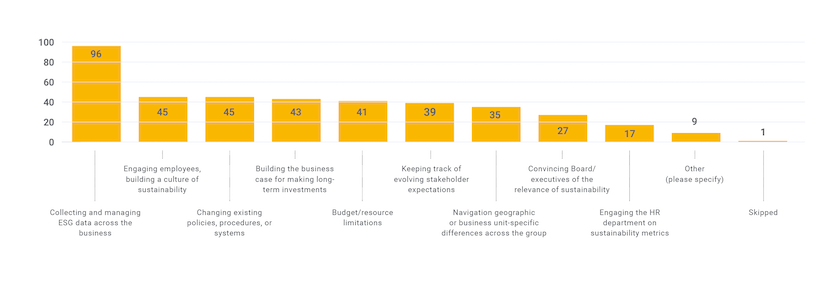Thank you for visiting the Finch & Beak website. Finch & Beak is now part of SLR Consulting, a global organization that supports its clients on setting sustainability strategies and seeing them through to implementation.
This is an exciting time for us, as our team now includes an array of new colleagues who offer advisory and technical skills that are complementary to our own including Climate Resilience & Net Zero, Natural Capital & Biodiversity, Social & Community Impact, and Responsible Sourcing.
We would like to take this opportunity to invite you to check out the SLR website, so you can see the full potential of what we are now able to offer.
Since 2013, Finch & Beak has been addressing the reporting trap, a trap in which companies get caught that struggle to progress on implementation because of reporting activities. As one respondent elaborates on their experience and desirable solution:
“Our hope is that EU CSRD or even better a global framework for non-financial data will replace the need of all these ESG-indexes, thus allowing us to focus on the one report and do that one well, and hopefully help our stakeholders to be able to evaluate us correctly.”
The questionnaire was sent out to 2,972 recipients and completed by 143 respondents. The overall conclusion is that for most of the responding companies, the reporting trap is dangerously set; due to mounting workloads to generate ESG data and the absence of standards, the undesirable trade-off between index and impact occurs frequently.
One of the first striking findings in the dataset was the struggle of the majority of companies with collecting and managing ESG data across their business. 96 out of 143 respondents mention this as one of their main challenges in the area of ESG reporting.

Balancing between Index and impact remains a struggle that can only be addressed by selecting and prioritizing the right ESG benchmarks. Not each sandbox is suitable to play in. Our report includes an elaborate section on picking the right benchmarks.
Another important aspect is the toolbox companies apply in activating their ESG programs. In most toolboxes, we found effective drivers such as setting targets and KPIs (76%) and having a multi-year roadmap (68%). What was lacking, however, was engagement, signaling a surplus of instrumentalism. Supplier engagement (27%) and employee training (22%) on the topic of ESG stood out due to their frequent absence. To achieve ambitious roadmaps, targets and KPIs, all main stakeholders must be engaged.
To help accelerate the ESG roadmap of your company, our report contains three elementary suggestions.
1. Activate the results from the materiality assessment
Use the inputs and outcomes of the materiality assessment as a starting point for the company’s (sustainability) strategy, to have the most impact and use resources in the most efficient manner.
2. Consider a lean materiality process to focus on local execution
Engage stakeholders from the very start of the project (especially for those topics with local/business-unit implications) and undertake a lean approach to the materiality process to best define and approach the materialities.
3. Bring materialities to life through flagship programs
Develop flagship programs for core focus areas to drive stakeholder collaboration, thereby improving sustainability within the value chain, and ultimately generating more consequent impact for all parties
In case our report inspires you to take topics such as sustainability in the supply chain, stakeholder engagement and ESG-benchmarking to the next level, feel free to reach out directly to our Consultant Johana Schlotter (johana@finchandbeak.com or +31 6 28 02 18 80) to discuss potential next steps within your company.
Photo by Nashrodin Aratuc from Pexels
Finch & Beak
hello@finchandbeak.com
+34 627 788 170